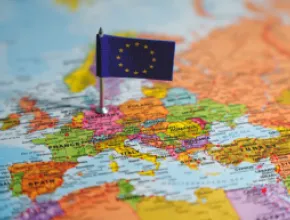The world is changing. That’s indisputable. But for meeting planners, a host of political, economic and safety issues can have especially far-reaching effects.
“It’s definitely not business as usual,” said Teresa Matamoros, business development manager for North America at Gaining Edge, a Melbourne, Australia-based company that works with convention and meetings industry clients. “More than ever, our industry has to deal with economic, political and safety issues that might not have been factoring [before] at the top of the decision-making process.”
As a result, the role of the meeting planner has “significantly changed,” according to Paul Van Deventer, president and CEO of MPI and co-chair of Meetings Mean Business, an organization that promotes the benefits of face-to-face meetings.
“In the not-too-distant past, they were really logistical players,” Van Deventer said. “Someone would come to them and say, ‘I’m going to bring x number of people together, find me a destination and service, food and beverage.’ That role began to evolve significantly in the last five to 10 years…and that strategic role and evolution is timely because of the political dynamics that are occurring on a global basis right now.”
Politics, Unusual
The current political climate in several nations has changed the realities for meeting planners.
“We have not been in a similar situation ever in the past,” Matamoros said, citing “an unconventional [political] leadership that has created skeptics in Europe and also in North America about the direction that the U.S. will take, and how will this affect them.”
Among the other destinations affected by current events is Turkey, according to Van Deventer.
“Look what’s happened in Turkey in the last three years,” he said. “Their event industry has pretty much collapsed because of concerns about the political environment, whether it’s individual terrorist attacks that occurred or just the overall approach of the administration.”
Rosy Burnie, managing director of M.I.C.E. in the Bag, a U.K.-based company that provides facilitation services for buyers and suppliers, agreed that Turkey is one of the strongest examples of major shifts.
“Istanbul was a rising star in the events industry from European organizers, “ she said. “However, after recent events, most have canceled or stopped booking events there.”
Brexit is another development that has the meetings industry on alert.
“It has been difficult to quantify [the effect], as most companies have continued to do business as usual,” Burnie said. “However, with the fall of the value of the sterling pound, it means that the U.K. has been a cheaper place to host incoming events.”
The proposed travel ban in the U.S. is already affecting the meetings industry, according to some experts.
A survey conducted by Meetings Mean Business just a week after the initial executive order was issued revealed potential challenges, according to Van Deventer.
“We got almost 2,000 responses within two days from our membership,” Van Deventer said. “Fifty-four percent said that it would have immediate and lasting harm on the impression of the U.S. as a destination.”
Van Deventer added that the travel restriction issue isn’t limited to the proposed U.S. travel ban.
“There’s been a movement on a global basis that’s been going on for years, and it’s gained a lot of momentum in recent years, [promoting] isolationism or nationalism or populism or whatever ‘ism’ you want to use. There is no doubt that it will have an impact on the live events industry as legislation goes forward.”
David Kliman, president of the Kliman Group, a communication consulting firm in Santa Rosa, Calif., said travel bans and other changes are creating a real sense of uncertainty.
“Some meeting planners might feel like they’re walking on Jell-O,” he said. “There’s so much misinformation, so little context and experience around this. Planners are used to being in charge, having information and being able to make informed decisions, and they don’t have that now.”
Eric Blanc, director of sales, marketing and convention services at the Tampa Convention Center, agreed.
“The biggest challenge we are hearing from our meeting planners is the uncertainty surrounding the U.S. travel restrictions that are currently being contested in the courts,” he said. “Many groups that are technology- or education-specific have large groups of members who travel from the areas affected by the proposed travel ban.”
Still, others say it’s still too early to determine the long-term effect.
“We are keeping a close eye on the travel ban, but frankly we don’t know how it will play out yet, and it’s difficult to speculate,” said Andrew Flack, vice president of marketing and ecommerce for the Americas at Hilton. “Thus far, we have not seen a direct impact on our business.”
PageBreak
Safe and Secure
An array of safety concerns has made the meeting planning process more complex, according to Van Deventer.
“We’ve seen [security issues] in the last year jump to the number-one concern with our planners within MPI,” he said. “And it’s not just terrorism or a live shooter act. It’s looking at natural disasters, it’s looking at health crises.”
David Peckinpaugh, president of Maritz Global Events, concurred about the increased focus on security and safety.
“The landscape has changed,” he said. “The new normal is a focus on safety and security for sure. We have not seen any dramatic shift in events or destinations being selected, but a more measured approach to safety and security.”
According to Kliman, there is a newfound respect and focus on effective risk management.
“It’s long overdue,” he said. “It’s absolutely required, whether you’re meeting in Raleigh, N.C., a regional destination or in a world capital. There is a continuity of care, a burden of care that meeting professionals have for their attendees, and risk management has to be a part of that, now more than ever.”
Wide-Ranging Effects
Van Deventer summarized the current challenges by dividing them into three types of effects.
“I’m seeing and hearing about three different impacts,” he explained. “The first impact is, ‘I have an event, it’s been scheduled, and I’ve lost delegates because of what’s been happening.’ That’s an immediate, micro impact. We saw that the week after the [travel ban] executive orders. There was an event for African delegates coming to the U.S. that normally has about 200 people, and half of them were denied their visa.
“The second impact is where people or planners are actually canceling or moving an event,” he continued. “The third area is the immeasurable but longer-term impact. If you’re looking at a conference with a citywide group of delegates, you might be upward of five, six or seven years out in your planning cycle. We’re hearing about U.S. destinations that may be pulled out of consideration for that cycle.”
Among those reporting little effect so far is Peckinpaugh.
“From our business perspective, we have seen very little impact so far due to any of these issues,” he said. “We’ve had a handful of guests who have been inconvenienced due to the travel regulations. On the positive side, we’ve seen opportunities as a result of Brexit, due to advantages of the exchange rate from a U.S. perspective, and we’ve seen very little impact on attendance or investments in events.”
Facing Reality
To succeed in today’s often-unpredictable environment, planners must stay up-to-date, according to Van Deventer.
“[They] need to be very current about what is happening, whether it’s political, financial or currency-related, or any issues going on about the ability of people to travel and the free flow of potential delegates,” Van Deventer said.
“Planners are getting much more engaged in their own networks, whether it’s through associations, social media sites, training online and in person,” he said. “Education, awareness and ongoing networking and communication are becoming key components for any successful planner.”
Kliman agreed about the need for planners to stay informed, especially through colleagues.
“Your peers are in the same boat, so talk to them,” he advised. “Read the news. [Look for] local partners in the ground, whether it’s to deal with risk management issues or travel issues. It’s absolutely paramount to have trusted partners.”
Peckinpaugh stressed the need for a patient approach.
“We all need to take a deep breath and let some of these issues work themselves out,” he said. “The biggest mistake we can make is to jump to conclusions and start altering our business models when so much is still in flux. However, we also can’t put our heads in the sand and pretend that everything is just fine.
"My advice is to become informed," Peckinpaugh continued. "Visit the U.S. Travel website and get engaged in the Meetings Mean Business Coalition efforts. Both sources offer up-to-the-minute information on all of these issues, as well as the potential ramifications and solutions of each issue.”






